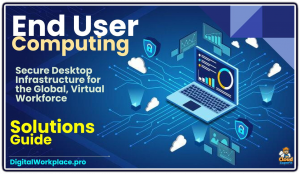Role of End User Computing in Enabling the Remote Virtual Workplace
 In today’s digital age, the concept of remote work has gained significant traction.
In today’s digital age, the concept of remote work has gained significant traction.
With the rise of virtual workplaces, the role of End User Computing (EUC) has become increasingly crucial in enabling seamless operations and enhancing productivity.
Let’s delve into how EUC plays a vital role in facilitating the remote virtual workplace.
- Enhanced Connectivity: End User Computing technologies such as virtual desktop infrastructure (VDI) and remote access solutions enable employees to stay connected to their work environment from anywhere. This connectivity ensures that teams can collaborate effectively and access necessary resources without physical limitations.
- Flexibility and Mobility: By leveraging EUC tools, employees have the flexibility to work from various locations, whether it’s from home, a co-working space, or while traveling. This flexibility not only enhances work-life balance but also allows organizations to tap into a global talent pool without geographical constraints.
- Security and Compliance: EUC solutions provide robust security measures to protect sensitive data and ensure compliance with industry regulations. Features like encryption, multi-factor authentication, and remote data wiping help safeguard information in the virtual workplace environment.
- Improved Productivity: With EUC tools in place, employees can access their work applications and files seamlessly, leading to improved productivity. The ability to work efficiently from any location, coupled with personalized user experiences, empowers individuals to focus on their tasks and deliver results effectively.
- Cost Efficiency: Implementing EUC solutions can result in cost savings for organizations by reducing the need for physical infrastructure and office space. By transitioning to a virtual workplace model, companies can streamline operations and allocate resources more efficiently.
- Scalability and Adaptability: End User Computing allows businesses to scale their remote work capabilities based on evolving needs. Whether it’s accommodating a growing workforce or adjusting to changing market dynamics, EUC solutions offer the flexibility to adapt quickly and efficiently.
- Employee Empowerment: Empowering employees with the tools and technologies they need to succeed in a remote virtual workplace fosters a sense of ownership and accountability. EUC enables individuals to take control of their work environment and deliver results with confidence.
In conclusion, End User Computing plays a pivotal role in enabling the remote virtual workplace by enhancing connectivity, promoting flexibility, ensuring security, boosting productivity, driving cost efficiency, enabling scalability, and empowering employees. Embracing EUC technologies can transform the way organizations operate in a digital-first world, leading to increased efficiency and success in the virtual work landscape.
EUC Forum
A key organization to learn more is the EUC Forum.
The home of end user computing topics and presentations, all are welcome to join a fun and friendly event with an open forum for listening and learning. Events are organised by the community, for the community. Speaking sessions are openly contributed by community members to share individual experience and knowledge.



